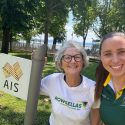
Pectus carinatum (PC) is a chest wall deformity involving an overgrowth of the cartilage that exists between the ribs and the sternum at the front of the chest. The result can be seen as a lump, bump, or protrusion forwards – which often causes the chest to appear asymmetrical.
PC has a relative frequency of around 1 in 1000, and is 4 times as common in male-born individuals. Approximately 90 per cent of cases are diagnosed after the age of 11 years, as most children enter puberty. Family members, friends or your child may notice a change in the shape of their chest more noticeably when growth spurts occur.
Unlike a related but separate condition, pectus excavatum (sunken chest) – in which the sternum and ribs may dip in towards the spine. PC does not routinely affect internal organs. However, some children may experience changes to their exercise tolerance or discomfort when laying flat on their stomach or during contact sports. Importantly, PC can have an enduring impact of a child’s social and mental wellbeing and is often among the main drivers for seeking assessment.
Historically, a watch and wait approach and the potential for surgical intervention were the primary options available to families. The prevailing bank of evidence regarding management options now consistently favours consideration of bracing as first-line therapy for appropriate individuals.
Common Signs & Symptoms
Initial signs of PC may be the appearance of a ‘bump’ or protrusion to the sternum or adjacent ribs. As mentioned, these changes may cause an asymmetrical appearance of the chest wall. Given that most cases of PC are identified early on in their course, most children do not experience any additional symptoms. However, some children may experience:
- shortness of breath during exercise
- Tenderness or pain on compression of the chest during activities such as contact sport, surfing or bodyboarding, laying on their front.
When should you speak to your Doctor?
If there are any concerns relating the the shape of your child’s chest and ribcage. The first step to take is an appointment with your GP, who can examine your child and refer you to an appropriate Paediatric surgeon. Diagnosis can be supported by additional testing such as chest x-ray if there is reasonable suspicion of scoliosis.
How is Pectus Carinatum treated?
The choice of treatment options for PC is dependent upon the severity of the condition. Some children and older teenagers will require surgery for correction, while the majority will be suitable for a course of bracing using a chest orthosis to correct the shape of the chest as your child grows.
Braces apply compression over the area of the protruding ribs and sternum to hold them in a typical position. Continued use of the brace as your child grows towards skeletal maturity allows the shape of the chest of be corrected and then maintained until no further changes may occur.
There are two main phases of wearing the chest brace:
- Corrective phase — wearing the brace daily up to 23 hours per day
- Maintenance phase — typically wearing the brace 8-10 hours per day
Regular monitoring of adherence to brace use, changes to chest shape and appropriate fitting of the brace are undertaken throughout the entire treatment process to ensure optimal outcomes can be achieved.
Westmead Private Physiotherapy Services
Our physiotherapists are experienced in providing care to patients and families who are pursuing bracing options for the management of pectus carinatum (PC) with referral from their Paediatric surgeon.
Our practice is a recognised distributor of the FMF Dynamic Compressor System by Pampermed. It is a made-to-measure custom brace device specifically designed for patients with PC. which applies the specific pressures required to gradually correct the protrusion and asymmetry over time. The brace has the ability to be adjusted by our physiotherapists over time as the shape of the chest corrects such that the appropriate compression is maintained.
If you have any questions related to this post or in general relating to pectus carinatum. Please contact us on 9633 1035 or admin@westmeadphysio.com.au so that one of our treating physiotherapists can reach out to you.









